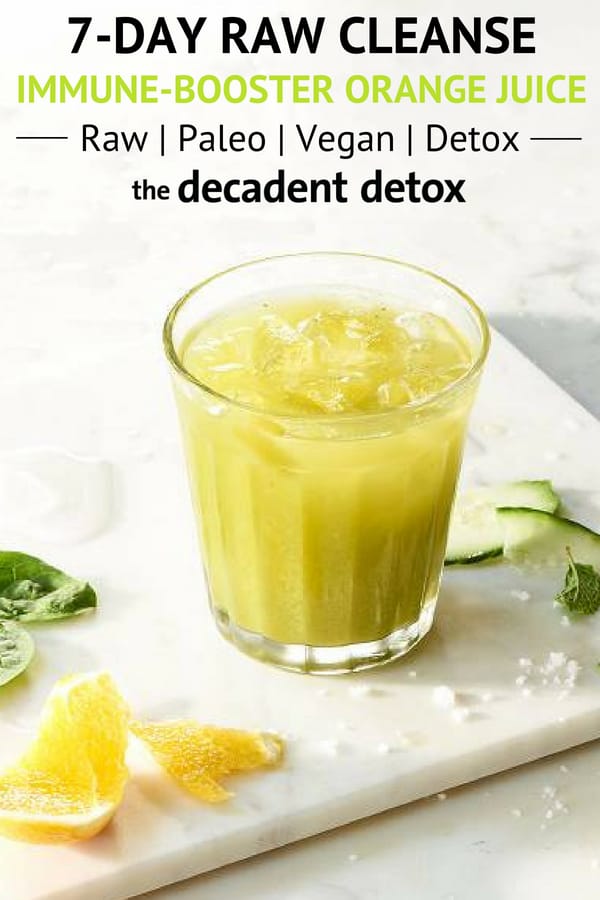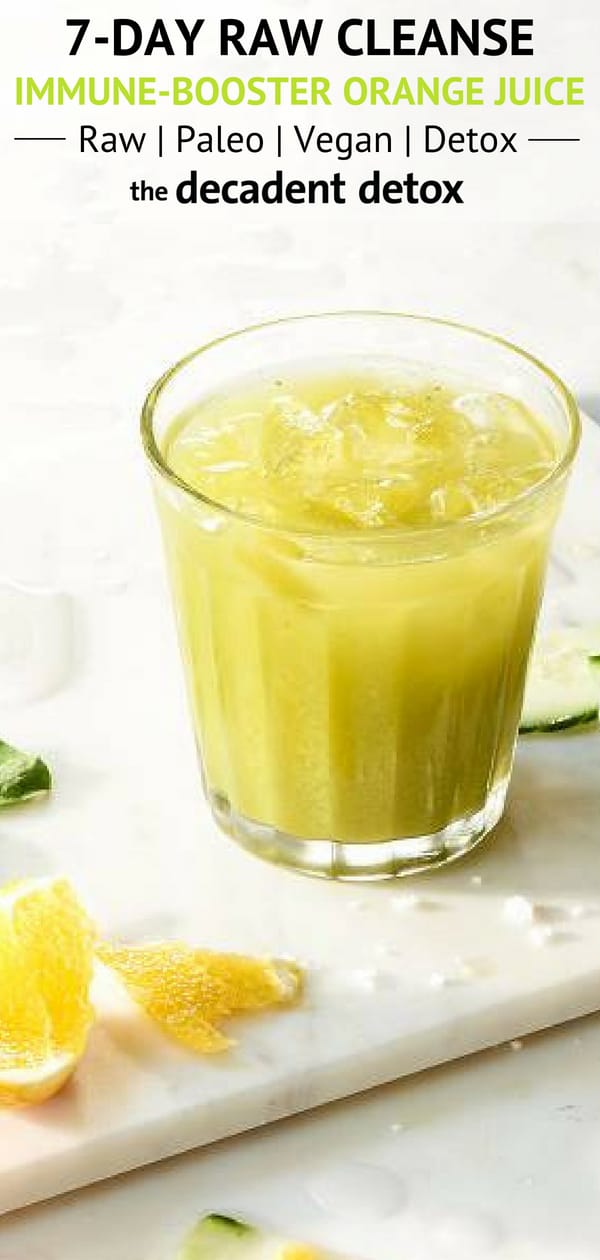Immune-Boosting Green Juice
This immune boosting juice recipe is from the 7-Day Cleanse I created for Daily OM, and this is one of my favorite green juices from the program. This delicious, sweet, refreshing juice is designed to flush toxins, alkalize, energize, and hydrate.
Juice Ingredient Benefits:
The Health Benefits Of Orange Juice
Loaded with vitamin A, beta-carotenes, B-complex vitamins, potassium and calcium, oranges muscle up immunity. Like other citrus fruits, they’re an excellent source of vitamin C and other antioxidants to combat free radicals. They also contain anti-inflammatory agents to combat arthritis and heart disease. Orange is a slightly cooling fruit, and blends well with most fruits and vegetables. They’re especially great in juices with carrots, beets, and greens. We recommend removing most of the rind before juicing, as too much will make your juice bitter. A little bit of rind adds a zesty edge.
The Health Benefits Of Cucumber Juice
This vege-fruit truly is the ultimate cool-hydrate-cleanse food. It’s right in there regulating body temperature and easing inflammation. A relative of squashes and melons, the cuke is a natural diuretic (due to that abundant water), aiding in cell hydration, waste removal, and dissolving kidney stones. Cucumber’s high silica content is great for the skin, and helps alleviate eczema, psoriasis, hair loss, and strengthen nails. The silica in cucumber also reduces the concentration of uric acid, which causes inflammation in the joints, muscles and tendons. A natural blood-pressure regulator, cucumber is high in vitamin A (mostly in the peel), B complex, C and folic acid, amino acids (methionine and tryptophan), potassium, sulfur, and natural chlorine. To take advantage of the nutrients in the skins, we always use the less-bitter-skinned English/Dutch variety. Any cucumber, though, goes well in our recipes.
We add cucumber to many juice blends as a way of adding mineral-rich water that’s way more beneficial than the plain filtered stuff. Cucumber juice is chock-full of nutrients, yet barely alters flavor. Cucumbers are intensely alkalizing, and a half (or whole) cucumber worked into a batch of juice offsets the acidic effects of high-sugar fruits and aids detox. Cucumber is our go-to base for sugar-free, alkaline juice blends, too. Make sure your cucumber is organic and hasn’t been embalmed in a coating of wax.
The Health Benefits of Spinach Juice
Highly alkalizing, spinach contains nearly twice as much iron as any other green, and helps to build blood by helping red blood cells carry oxygen. It also helps strengthen all other cells, particularly those of the respiratory system and brain. Rich in chlorophyll and carotene, spinach can help reduce the development of abnormal cells and macular degeneration. Rounding things out, spinach also provides carotenoids, lutein, vitamins A, B complex, C, K, folic acid, iodine, potassium, calcium, magnesium, phosphorous, sodium and manganese, and many amino acids.
This popular and readily available mild leafy vegetable serves as a great introductory green for juicing. While spinach is cooling, we include it in every seasons cleanse since it’s a versatile ingredient that pairs well with all fruits and vegetables.
The Health Benefits Of Lemon Juice
This alkalizing tart tamer is a potent detoxifier and natural antibiotic that improves liver function, relieves constipation, and can help dissolve kidney and gall stones. High levels of vitamin C help boost immunity and alleviate symptoms of osteoarthritis and rheumatoid arthritis, as well as combat heart disease. Lemons provide calcium and magnesium for strong bones and teeth, along with unique compounds that have powerful antioxidant properties. The flavonoids in lemons have even been shown to halt abnormal cell division.
While lemons are cooling, this superstar can be balanced with warming foods like cayenne and fennel. We use lemons in lots of juice blends to lift the earthy and pungent quality of leafy greens and vegetables, add zip and tang, and balance the acidifying impacts of high-sugar fruits. You may want to remove the rinds of these fruits before juicing, as in substantial quantities they’re slightly toxic, or you may enjoy the zesty punch it adds—a good compromise is a bit of the peel along with the flesh.
The Health Benefits Of Mint Juice
Delivering potassium, calcium, iron, manganese and magnesium, beta-carotine, and vitamins A, C, E and K, mint also contain B-complex, including folates, riboflavin and pyridoxine (B6). One of the oldest remedies in use for indigestion and flatulence, mint can help bring down cholesterol and high blood pressure. It’s a natural topical anesthetic for the mouth. Through the action of menthol on cold receptors in our skin and mucous membranes, the herb delivers a cool sensation when eaten, inhaled or applied. Compounds in peppermint, specifically, relax the intestinal wall and sphincter muscles, and work as an anti-spasmodic agent in the treatment of irritable bowel syndrome (IBS) and other colic pain disorders. With these additional properties, peppermint is a great cleanse go-to.
Though a cooling herb, mint brings a bright, warm accent to cold weather juices, and offers a clean flavor that’s especially pleasant during a detox. That flavor pairs especially well with mild leafy greens, apple, melon, lemon, and pineapple. Juice the entire stalk, stem and leaves.
Add High Quality Salt To Your Juices For Great Flavor
I add a pinch of alkalizing mineral-rich Celtic sea salt to all juices to boost the natural flavor of fruits and veggies; temper the acidity of sweet fruits; stimulate the lymphatic system; replenish electrolytes; aid digestion; and help the body access energy. I do not recommend adding common table salt which is generally heated to extreme temperatures, iodized, bleached, processed, and refined. This salt does not have the same benefits. If you have a health condition that requires you to limit your sodium intake consult your doctor before adding salt to your juices.
I Use Omega Juicers
I get asked a lot about juicers, and which juicer is the best. I own a lot of different makes and models of juicers, and my favorite juicers are made by Omega Juicers.
I’m really excited about the new Cube Juicer because it is such a design innovation game-changer that I can’t believe nobody has launched something like this sooner. The juicer comes in red and silver, so I, of course, got the red to match all of our other appliances.
This awesome new machine is a slow-speed juicer with a dual stage masticating extraction process that chews through fruit and vegetable fibers for the highest juice yield, and ejects the pulp into a separate container. This machine has a very similar process to the Omega 8006 masticating juicer. The 8006 is my all-time favorite juicer as it handles leafy greens, hard veggies, and high-water content fruits equally. It’s also super easy to clean.
With the Juice Cube 300, Omega has taken the functionality of its best juicer, and created a compact, square, industrial design for easy storage and a chic look. This is the most gorgeous juicer I’ve ever seen, and looks amazing on the counter top. Watch the short video I did about how to unpack it, use it, and put it back together. It’s super easy.
This juicer is a multi-purpose machine. While it has a traditional juice screen, it also comes with a homogenizing cone so you can make nuts butters, nut milks, pulverize baby food, whip up instant frozen fruit sorbets, extrude pastas, or even grind coffee beans and spices. I’ll do a video showing you how to do that, too.
- Low Speed Juicer and Nutrition System
- Compact Size with Storage Compartment
- Gear Reduction Equivalent of 2 HP Motor
- Slow Rotation Speed at 80RPM
- Exclusive “Dual Stage” Masticating Extraction
- Continuous Juicing with Automatic Pulp Ejection
- BPA-Free
- 6 nozzles and 1 juicing screen
- Quiet Operation
- Silver or Red Finish
- 15-Year Warranty
Learn more about Omega Juicers.
*I was compensated for this post, but my opinions are my own.
Do you need a reboot?
Join the 7-Day Raw Cleanse.
Let me know what you think of this recipe in the comments!
Your feedback is important to me, and it helps me decide which recipes to post next for you.









